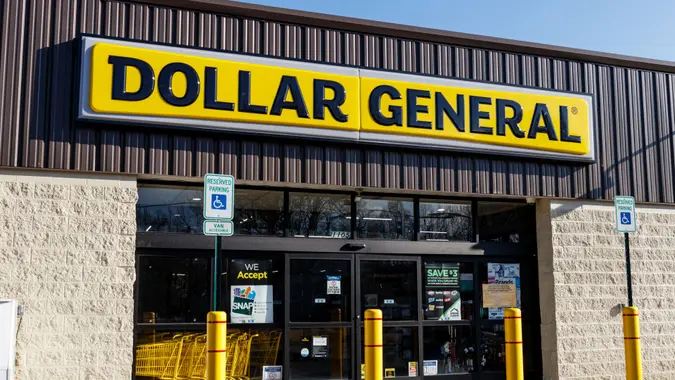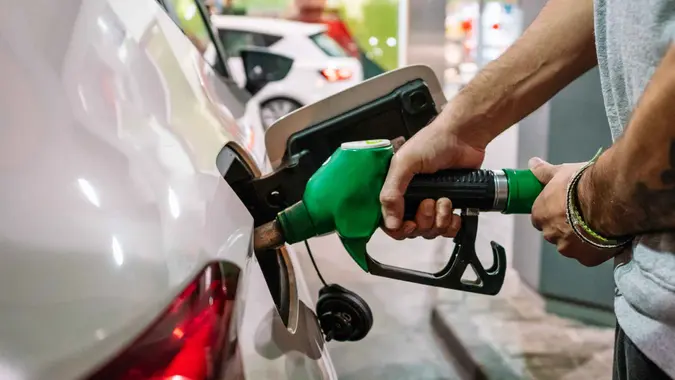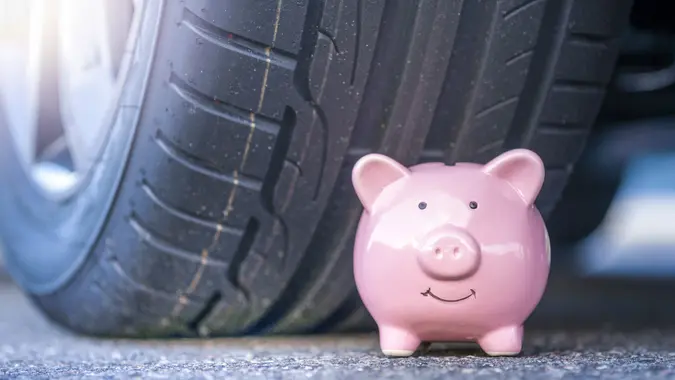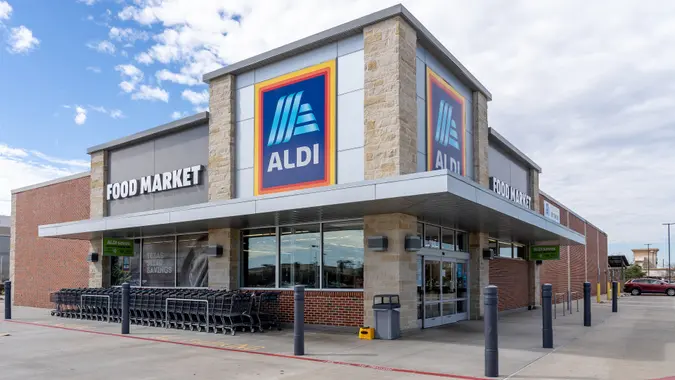5 Ways Americans Sabotage Their Savings

Commitment to Our Readers
GOBankingRates' editorial team is committed to bringing you unbiased reviews and information. We use data-driven methodologies to evaluate financial products and services - our reviews and ratings are not influenced by advertisers. You can read more about our editorial guidelines and our products and services review methodology.

20 Years
Helping You Live Richer

Reviewed
by Experts

Trusted by
Millions of Readers
 While the latest news proclaims that the economy is rebounding, the truth is that most Americans are wasting their money. Spending is up, which is good for the economy — but can spell bad news for consumers on a personal level.
While the latest news proclaims that the economy is rebounding, the truth is that most Americans are wasting their money. Spending is up, which is good for the economy — but can spell bad news for consumers on a personal level.
“Consumers who find themselves mired in debt are serving the larger economy at great personal sacrifice,” said Stuart Vyse, professor of psychology at Connecticut College and author of “Going Broke: Why Americans Can’t Hold on to Their Money.”
“The economy runs on consumption, and as a result, personal savings is never mentioned because it is considered counterproductive and a drag on the economy,” Vyse said.
According to the Employee Benefit Research Institute’s (EBRI) annual Retirement Confidence Survey, Americans are living longer — and they do not have anywhere near enough saved in their bank accounts for retirement. In fact, the report found that the majority of Americans (57 percent) have less than $25,000 in total household savings or investments.
Where and How People Spend Money Instead of Saving
Certainly recent economic hardships have reduced disposable income and the ability to save for many, but are there other factors influencing how Americans spend money? We asked financial experts why Americans can’t seem to keep their money in their bank accounts.
1. Lack of Personal Finance Education
“One of the main reasons that people don’t save money in the short- or long-term is that they’re simply unfamiliar with concepts such as setting a monthly or annual personal budget and saving for retirement,” notes Andrew Schrage, co-owner of MoneyCrashers.com.
2. No Emergency Savings
Too many people have experienced unexpected financial hardship, caused by being out of work for long and short periods of time, or having a car breakdown or health crisis that an emergency fund could help cover.
“Despite how high a salary might be, one is likely to be broke due to the lack of preparation for emergencies,” said Xavier Epps, owner of XNE Financial Advising, LLC in Woodbridge, Va. “Emergency savings is the key to financial success and without it, you’re just making it more difficult to be financial stable.”
According to the Bureau of Economic Analysis, Americans only saved 2.5 percent of their income on average for the month of April, 2013.
“Consumers should aim to save much more in order to cover unexpected expenses and possibly job loss,” recommended Epps.
3. High Inflation
Some personal finance experts point to inflation as a big factor in suppressing people’s ability to consistently add to their bank accounts.
“Our government deficit spending has skyrocketed, and the main cost of that spending is weaker buying power for the dollar,” said Brian Luftman, founder and president of American Farm Investors in Lexington, Ky.
“Our government says inflation is at 3 percent, but Americans are paying significantly more for food, heating and cooling bills, gasoline and healthcare,” Luftman said. “All of those costs have virtually doubled since 2008, and very few Americans are making any more money than they were in 2008. I think real inflation is 10 to 15 percent a year, and I don’t see that changing.”

4. Overspending Made Easy
“With social media like Facebook and Twitter and we can see what everyone in our own social circle is doing, what they are purchasing, and where they are eating, traveling and shopping,” said Rachel Parrent, community engagement manager for Vantage Credit Union. “Many times it makes us believe that if they can afford it, so can we.”
Simply put, too many people spend money they haven’t earned.
“People fall into bad habits like eating out regularly or thinking that spending a little here, a little there won’t amount to a lot by the end of the month,” said Kathy Palmer, vice president of marketing at Vantage Credit Union. “Credit cards and electronic purchasing make it much easier to spend than having cash in your pocket.”
These social pressures and the ease of spending combine to create an environment that “places enormous burdens on self-control” and how people spend money.
“All of the barriers to consumption have been removed: you can shop 24-hours a day, with or without cash on hand,” Vyse said. “The urge to purchase something can be satisfied in minutes without ever leaving home.”
Photo credit: SimpleIllustrations
5. Taking on Big, Long-Term Loans
“Perhaps the worst mistake people make is to assume large, long term debt burdens that are difficult to escape without the certainty of enough sustained income to support them,” Vyse said. “In today’s world, the most common examples are student loans and mortgage loans. If you have calculated incorrectly or if your income drops, these kinds of debts can have a dramatic effect on your life and well-being.”
Should circumstances change and the borrower is unable to make monthly payments toward these debts, there is no quick-fix solution.
Considering that the graduating college class of 2012 accrued an average of $29,400 in student loan debt, an increase of 63 percent in under a decade, rising college costs definitely play a role in the ability to save.
“By having to make significant monthly payments for student loans shortly after graduating, it can be virtually impossible to start an emergency fund or begin saving for retirement,” Schrage said. “It can even make staying on top of monthly bills a challenge, which often leads to credit card debt.”
Brian Frederick, JD, CFP of Stillwater Financial Partners in Scottsdale, Ariz., adds that student debt doesn’t just affect younger generations, but parents as well.
“I’m seeing more and more people sacrifice their own retirement savings needs and run up large credit card balances to fund their children’s college,” Frederick said. “This can result in credit card debt of $20,000 and up at high interest rates — without a lot of excess cash flow to pay down the debt, they just keep paying the interest and not a whole lot towards principal.”
Tips to Jump-Start Your Bank Account
Devotees of personal finance guru Dave Ramsey know that the first step to gaining financial independence is putting away $1,000 for emergencies. Other financial experts recommend an even bigger emergency fund of three to six months of expense, to act as a buffer.
To get there, financial experts recommend eliminating everything but the basics to build up that emergency fund. That can mean cutting your cable service, cooking at home, trading high-lease cars for low-cost transportation, hosting yard sales or finding another job to supplement your income. It’s drastic, but a necessary way to get through, and prepare for, some tough times.
“Look for ways to cut or eliminate your monthly expenses and bills,” Schrage said. “Limit personal purchases only to those that you actually need, and clip coupons to save on groceries. All of these ideas should make for the ability to save at least a modest amount each month.”
In addition to limiting spending, Vyse advised cultivating a habit of saving. He recommends having a certain percentage of deposits automatically diverted to a savings account.
“This way, money is saved no matter what else happens, and it does not require a deliberate action on your part,” Vyse said.
Photo credit: Sophia D Photography
 Written by
Written by 
























